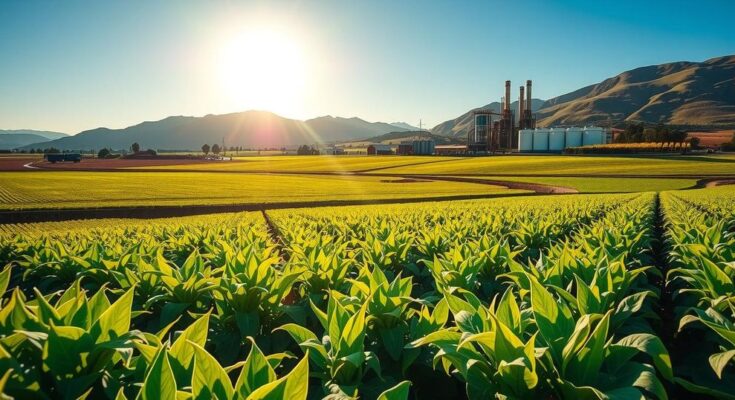The NPK fertilizer plant in Bolivia, inaugurated in October 2023, has produced 4,555 tons of fertilizer, generating 23.9 million bolivianos. It aims to meet domestic needs and enter export markets, enhancing local agriculture and reducing import dependence. The facility is projected to produce 60 thousand tons annually, significantly increasing agricultural yield by 60%.
The new NPK fertilizer plant in Bolivia has commenced production with an output of 4,555 tons, generating revenue of 23.9 million bolivianos, equivalent to over seven million dollars. Inaugurated by President Luis Arce in October 2023, this facility is part of a broader initiative to enhance industrialization and reduce import reliance. It is strategically located alongside the Santiváñez Industrial Park in Santa Cruz.
General Manager Jorge Martínez emphasized the plant’s potential to export, stating, “The whole world wants to buy fertilizers and we, as a country, are privileged.” The facility aims to fully satisfy national fertilizer demands while also tapping into global markets.
Constructed by Sur Energy SRL at a cost of eight million dollars within a year, the plant will source raw materials from various local companies, including YPFB and YLB. With projections indicating that 35 percent of production will serve the domestic market and the remainder will be allocated for export, Bolivia is on track to eliminate its fertilizer imports.
The plant is projected to produce approximately 60 thousand tons annually of NPK and slow-release granulated urea, two highly sought-after fertilizers. These products are expected to increase agricultural yields across Cochabamba and the country by 60%.
This facility marks the first of nearly 170 proposed plants under the national government’s industrialization strategy aimed at substituting imports and boosting local production.
The establishment of the NPK fertilizer plant in Bolivia signifies a pivotal move towards self-sufficiency and industrialization. With significant production capabilities and export potential, the plant is anticipated to bolster domestic agriculture and generate substantial income for the nation. This initiative highlights Bolivia’s commitment to industrial advancement and economic growth by reducing dependency on imports.
Original Source: www.plenglish.com




